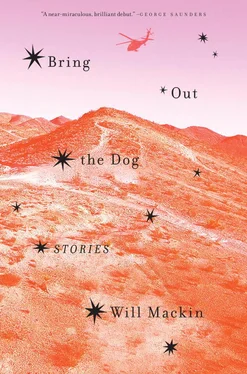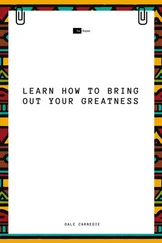Will Mackin - Bring Out the Dog
Здесь есть возможность читать онлайн «Will Mackin - Bring Out the Dog» весь текст электронной книги совершенно бесплатно (целиком полную версию без сокращений). В некоторых случаях можно слушать аудио, скачать через торрент в формате fb2 и присутствует краткое содержание. Город: New York, Год выпуска: 2018, ISBN: 2018, Издательство: Random House Publishing Group, Жанр: prose_military, на английском языке. Описание произведения, (предисловие) а так же отзывы посетителей доступны на портале библиотеки ЛибКат.
- Название:Bring Out the Dog
- Автор:
- Издательство:Random House Publishing Group
- Жанр:
- Год:2018
- Город:New York
- ISBN:978-0-812-99564-0
- Рейтинг книги:5 / 5. Голосов: 1
-
Избранное:Добавить в избранное
- Отзывы:
-
Ваша оценка:
- 100
- 1
- 2
- 3
- 4
- 5
Bring Out the Dog: краткое содержание, описание и аннотация
Предлагаем к чтению аннотацию, описание, краткое содержание или предисловие (зависит от того, что написал сам автор книги «Bring Out the Dog»). Если вы не нашли необходимую информацию о книге — напишите в комментариях, мы постараемся отыскать её.
Bring Out the Dog — читать онлайн бесплатно полную книгу (весь текст) целиком
Ниже представлен текст книги, разбитый по страницам. Система сохранения места последней прочитанной страницы, позволяет с удобством читать онлайн бесплатно книгу «Bring Out the Dog», без необходимости каждый раз заново искать на чём Вы остановились. Поставьте закладку, и сможете в любой момент перейти на страницу, на которой закончили чтение.
Интервал:
Закладка:
All we had to do was stand perfectly still, in a line parallel to their direction of movement, at a range of no more than thirty yards, and wait for them to walk right in front of us. Then wait for Digger’s sparkle, which would be our signal to open fire.
This wasn’t our first time running an intercept on a Taliban patrol across a muddy field at night. In fact, it was our seventh. During the course of our previous six intercepts, we’d developed and refined this tactic. The enemy would walk right in front of us, and Hal would choose one man. Not the leader, he had explained, whose mind had been made up. And not the dumbass in the back, either, who’d never know any better. But a man in the middle. A man who understood what was happening well enough to have doubts. A man who, having walked this far through darkness, cold, and rain, was no longer sure where he ended and the night began.
Such confusion registered on night vision. When Hal found this man, he’d light him up with sparkle. The man wouldn’t know, because sparkle was infrared; it operated on a frequency that the naked eye couldn’t detect. So, as far as Hal’s chosen man or any of the other Taliban knew, they were still walking in the dark. They were still on their way to their destination. Meanwhile, Hal’s sparkle would reflect off the man’s wide-open eyes and shine back out like some special knowledge.
That would be the man we’d spare. And that would be the man who’d drop to his knees in the mud and, in a cloud of gun smoke, raise his hands in surrender. That would be the man who’d tell us who he was, where he’d come from, and why.
The Fire Truck
Iparked in front of the microwave antenna at the top of Craner Peak. A cold wind blew from the east. The warm sun floated overhead. Reed dropped the tailgate. We pulled the hard cases from the bed of the pickup. We shouldered our packs. We’d been home from Afghanistan just two months and already the pack that I’d worn there—the one that had become an extension of me—now felt like somebody else’s. Puffy white clouds dragged across the sky. Smooth rocks studded the domelike crest of the mountain. Reed and I carried the equipment over that crest, toward a footpath that wound down the mountain’s eastern face.
The snowcapped Wasatch Range came into view first, followed by Salt Lake City and the Great Salt Lake. The bombing range was in the sand between the western shore of the lake and the base of Craner Peak. The observation point, or OP, from which we’d control the jets that would drop the bombs, was a stone outcropping at the top of a steep draw.
Arriving at the OP, Reed and I lowered the hard cases. We slid out of our backpacks. I stepped to the edge of the outcropping and looked down upon the live impact zone.
A thousand feet below, atop a smooth field of sand, was a bright red fire truck.
“That doesn’t look right,” I said.
Actually, it looked like the fire truck had been trying to reach the center of the impact zone. As if, perhaps, there’d been a fire there, and in their haste to save the day, the firemen had driven off the hardened access road and gotten bogged down in the sand. They’d need a crane to lift it out.
“Anybody down there?” Reed asked.
Through the binoculars, I saw a set of boot tracks walking from the driver’s-side door back toward the access road.
“No,” I said.
Reed stuck his fingers in his mouth and whistled the way one might to hail a passing cab, or to turn a wayward dog. It was a bright, clean sound that seemed to penetrate everything and pull it slightly apart. Thus, the shadowed crags in the rocky draw, the silver horns on the white roof of the fire truck’s cab, the deep jade swirl at the center of the Great Salt Lake, all seemed to waver. I felt this instability in my heart, even, like it was foaming. If anybody was down on the impact zone, they would’ve felt it, too. They would’ve emerged from wherever they were hiding and raised their blank faces toward the OP.
Reed stopped whistling and the world stabilized. The fissure in my heart sealed. Nobody appeared on the impact zone.
“Maybe we should call Oasis,” Reed said.
“Worth a try,” I said.
Oasis was the radio call sign of the Utah Test and Training Range’s security force, whose primary responsibility was to protect the top secret laboratory located somewhere in the vast desert west of Craner. That lab was rumored to house extraterrestrials. Therefore, I imagined it to be a town like any other, with parades, baseball games, and fireworks on the Fourth of July, where extraterrestrials and human beings lived as one. Where the aliens taught us how to conquer entropy, and we taught them how to love. Such a place would require the strictest protection, which didn’t leave Oasis much time to manage the bombing ranges.
Reed removed the radio from his pack, powered it up, and tuned it to the proper frequency. “Oasis, this is Bulldog,” Reed broadcast.
Ten watts emanated off the radio’s omnidirectional antenna. Some of that energy descended into the draw, tumbled off the rocks, and spilled out over the lake. Some of it shot up into the sky, wormed its way through the ozone, and forged a path to infinity. Still more hopped Craner Peak, behind us, carrying Reed’s transmission over fields of warm sagebrush to a cinder-block waystation, where, en route to the range earlier that day, Reed and I had stopped to register with Oasis.
A counter spanned the linoleum width of that waystation. A guard wearing a stiff comb-over rested his elbows on it. Behind the guard were racks of shotguns, computers, radios, and closed-circuit televisions. Though the guard hadn’t looked busy, Reed and I had waited behind the sign that said, WAIT HERE. The guard had watched us as if through a one-way mirror.
Having received no reply to his first transmission, Reed keyed the mike again. His voice must’ve emanated from one of the radios behind the waystation guard. “Oasis, this is Bulldog. How do you hear?”
“Go ahead, Bulldog,” the guard replied.
“I’m standing on the OP, looking down at a fire truck on the impact zone. I’m wondering if it’s supposed to be there.”
“If it’s on the impact zone, then it’s a target,” the guard said.
“This doesn’t look like a target, is all. It’s got its windshield, still, and hoses. And it looks like it drove out there under its own power.”
The guard must’ve looked over his shoulder at the closed-circuit TV labeled CRANER. He must’ve seen the wave of sand piled up in front of the fire truck’s chrome bumper.
“Let me make a phone call.”
Radio static hissed as a tall white cloud passed by. Fossils cast in the stone outcropping resembled harpsichords and brains.
“They’re telling me that the fire truck is a target,” the guard said.
“Who’s telling you that?” Reed said.
“My supervisor, Bill.”
Maybe Bill was the type to understand how at any given moment a thing could be both target and nontarget. How the more you tried to nail it down one way or the other, the less known it would become. But chances were slim.
“I can have Bill call you if you want,” the guard offered.
“That’s okay,” Reed said.
“All right, then.”
Reed and I went through our setup routine. Opening the hard cases released the smell of ozone. We removed each piece of equipment from its foam rubber bed. We warmed the lasers, synced the clocks. We stabilized the coordinate generators. Ready, the equipment clicked and whirred. The radios whispered, Hush. Down on the sand, the fire truck shone in the sun. We waited for the jets.
Читать дальшеИнтервал:
Закладка:
Похожие книги на «Bring Out the Dog»
Представляем Вашему вниманию похожие книги на «Bring Out the Dog» списком для выбора. Мы отобрали схожую по названию и смыслу литературу в надежде предоставить читателям больше вариантов отыскать новые, интересные, ещё непрочитанные произведения.
Обсуждение, отзывы о книге «Bring Out the Dog» и просто собственные мнения читателей. Оставьте ваши комментарии, напишите, что Вы думаете о произведении, его смысле или главных героях. Укажите что конкретно понравилось, а что нет, и почему Вы так считаете.












